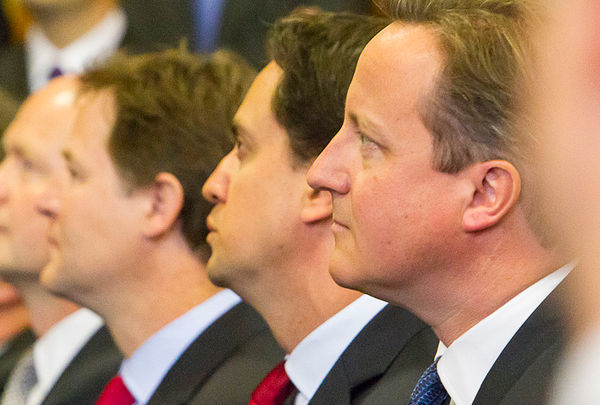Election 2015: How do parties compare on the arts?

© House of Lords 2013/Roger Harris
– "We may not be the biggest country, but our museums are second to none. In music, art, fashion, theatre, design, film, television and the performing arts, we have an edge. Conservatives understand these things do not just enhance our national prestige and boost our economy; they help tie our country together, strengthening the bonds between all of us."
– "We will keep our major national museums and galleries free to enter and enable our cultural institutions to benefit from greater financial autonomy to use their budgets as they see fit… We will support a Great Exhibition in the North; back plans for a new theatre, The Factory, Manchester; and help the Manchester Museum, in partnership with the British Museum, to establish a new India Gallery. We are also supporting plans to develop a modern world class concert hall for London."
– "The creative industries have become our fastest-growing economic sector, contributing nearly £77 billion to the UK economy – driven in part by the tax incentives for films, theatre, video games, animation and orchestras we introduced. Our support for the film industry has resulted in great British films and encouraged Hollywood’s finest to flock to the UK. We will continue these reliefs…"
– "Labour believes that art and culture gives form to our hopes and aspirations and defines our heritage as a nation. The arts allow us to celebrate our common humanity in the creation and celebration of beauty. The arts should belong to all and be open to all to take part in."
– "We will guarantee a universal entitlement to a creative education so that every young person has access to cultural activity and the arts by strengthening creative education in schools and after-school clubs. Institutions that receive arts funding will be required to open up their doors to young people, and we will work with public bodies to rebalance arts funding across the country."
– "Creativity is the powerhouse of a prosperous economy. It is the source of economic innovation and a powerful force in social renewal. We will increase the number of apprenticeships in the creative industries. We will create a Prime Minister's Committee on the Arts, Culture and Creative Industries, with a membership drawn from all sectors and regions. The Committee will bring issues of concern direct to the attention of the Prime Minister."
– "Liberal Democrats understand that arts, creative industries and culture are crucial to Britain's success and essential for personal fulfillment and quality of life. The UK's creative sector has been one of the great success stories of the past five years, and a critical driver of our recovery. We are proud of the arts in Britain and will support them properly, working to deliver access for all, regardless of income, ethnicity, gender, age, belief, sexuality or disability. We believe the arts have an essential role in our education system and will work to encourage creativity in our schools and universities."
• Maintain free access to national museums and galleries, while giving these institutions greater autonomy.
• Support growth in the creative industries, including video gaming, by continuing to support the Creative Industries Council, promoting creative skills, supporting modern and flexible patent, copyright and licensing rules, and addressing the barriers to finance faced by small creative businesses.
• [Under Mental Health Section] Promote evidence-based 'social prescribing' of sport, arts and other activity to help tackle obesity, mental health problems and other health conditions, and work to widen the evidence base."
– "[We will] abolish government departments when their essential powers and functions can be merged into other departments. Such departments will include the Department for Energy and Climate Change, the Department for International Development, and the Department for Culture, Media and Sport."
– "[We will] encourage regenerative arts projects into our coastal towns."
– "UKIP will promote a unifying British culture, open to anyone who wishes to identify with Britain and British values, regardless of their ethnic or religious background. This is genuine inclusiveness."
– "How politics is reported is vital for our democracy – active citizenship has to be informed citizenship. Public support for the arts is part of a civilised society."
– "The Green Party believes that the arts and humanities have an essential part to play in creating a more democratic, sane and participatory society."
• Increase government arts funding by £500 million a year to restore the cuts made since 2010 and reinstate proper levels of funding for local authorities, helping to keep local museums, theatres, libraries and art galleries open.
• Reduce VAT to 5% for live performances.
• Work to support fair pay productions in the arts.
• Support initiatives to make the arts and sports accessible to all.
• Give local authorities powers to encourage local live performance in the arts by moving funding from the regional to the local
level and modifying regulations so that small-scale live performance in pubs and similar venues is not stifled.










